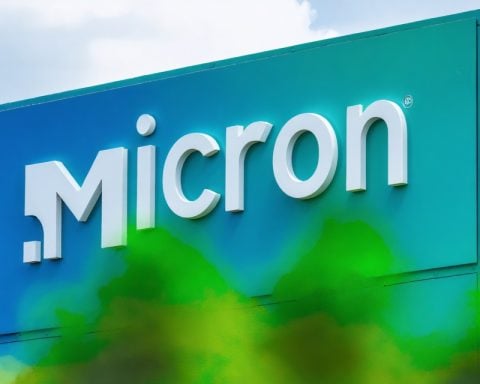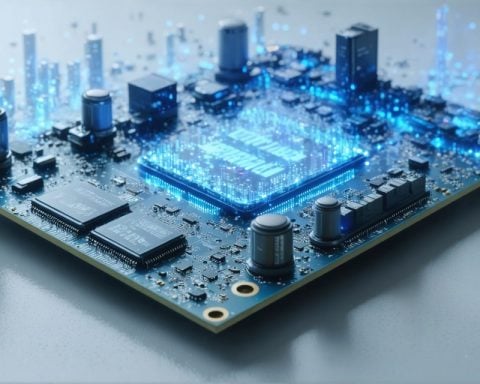In an impressive display of financial prowess, Nvidia has once again surpassed expectations with its latest quarterly earnings, sending ripples through the tech landscape. The company reported a remarkable 94% increase in revenue, reaching $35.1 billion, considerably outpacing the projected $33.1 billion. Adjusted earnings per share also soared from $0.40 to $0.81, exceeding Wall Street’s expectations.
Despite these achievements, Nvidia’s stock experienced a slight decline as investors anticipated more optimistic guidance for the upcoming quarter. Analysts had hoped for a stronger outlook, but the company’s projected revenue of $37.5 billion still signifies a 70% year-over-year growth. Currently valued at an astounding $3.5 trillion, Nvidia is the most valuable company globally and seems poised to hit the $4 trillion mark sooner than anticipated.
Supply Chain Constraints and Unwavering Demand
Since the launch of ChatGPT, Nvidia has demonstrated extraordinary revenue growth, although challenges remain. Supply is the primary bottleneck, with demand for Nvidia’s chips far outstripping production capabilities. Demand for the company’s latest Blackwell and legacy Hopper platforms remains incredibly strong, with expectations that supply shortages will persist well into fiscal 2026.
Market Leadership and Bearish Concerns
Nvidia continues to fend off competition, maintaining its market dominance due to its robust data center revenues and proprietary CUDA software library. Despite murmurings of an “AI bubble,” Nvidia’s growing demand among diverse industries illustrates its potential beyond just AI language models.
Valuation Insights
Although Nvidia’s stock trades at a high price-to-earnings ratio, its rapid growth justifies current valuations, making it an attractive investment. The company consistently outperforms earnings forecasts, suggesting its trajectory remains strong. With the stock needing only a 14% increase to achieve a $4 trillion market cap, Nvidia is firmly on its way to setting new financial milestones.
The Untold Impact of Nvidia’s Market Domination: Implications and Insights
Nvidia’s Unforeseen Social Influence: Beyond Technology
While Nvidia’s financial triumphs have captured the spotlight, there is an array of socio-economic effects stemming from its relentless growth that are equally worthy of attention. The company’s astounding success not only impacts the tech industry but also extends its influence into various facets of everyday life, shaping communities and employment trends globally.
Revolutionizing Workforce Skillsets
One fascinating ripple effect of Nvidia’s dominance is the transformation it is causing in the workforce. With Nvidia’s cutting-edge technology at the heart of various applications—from AI and data analytics to autonomous vehicles and scientific research—there is a surging demand for specialized skills. As companies increasingly adopt Nvidia’s platforms, the need for expertise in CUDA programming and machine learning accelerates, prompting educational institutions to re-evaluate their curriculum to better equip students for these high-demand roles.
Community Dynamics: Growth and Displacement
The global demand for Nvidia’s chips has resulted in significant growth for regions where manufacturing and development operations are based. This growth can revitalize local economies, providing employment opportunities and driving infrastructure development. However, there is also concern about potential displacement. As high-skilled tech industries flourish, community members lacking requisite skills may find themselves marginalized from these new economic opportunities, exacerbating social inequalities.
Environmental Considerations: The Hidden Cost
An often overlooked consequence of Nvidia’s chip production is the environmental impact. The manufacturing process is resource-intensive, with a considerable carbon footprint due to energy consumption and waste generation. This raises questions about the sustainability of such rapid technological expansion. What steps are companies like Nvidia taking to mitigate these environmental costs? Leveraging renewable energy sources and improving manufacturing efficiency are potential strategies to address these issues.
Balancing Technological Advancement with New Challenges
The introduction of powerful AI capabilities presents both remarkable opportunities and daunting challenges. On one hand, Nvidia’s technology is enabling breakthroughs in healthcare, education, and environmental research. On the other, it fuels rising concerns about privacy, cybersecurity threats, and ethical AI use.
Advantages and Disadvantages: A Closer Look
Advantages:
1. Innovation Catalyst: Nvidia’s technology drives innovation across multiple industries, enhancing productivity and fostering new product development.
2. Economic Growth: The company’s success contributes significantly to GDP growth in regions where it operates, boosting local economies through job creation.
Disadvantages:
1. Economic Disparity: Rapid technological advances may widen the gap between skilled and unskilled workers, leading to socioeconomic challenges.
2. Environmental Impact: Increased production demands raise environmental concerns, calling for more sustainable practices in the tech industry.
Looking Ahead: Is it Sustainable?
Facing supply chain constraints, environmental challenges, and ongoing market demand, the question remains: Can Nvidia sustain this unparalleled growth, and at what cost to society and the planet? This paradox of innovation versus impact sparks ongoing discussions in tech and policy circles.
For more on Nvidia’s technological advancements and strategies, visit Nvidia.
As we explore these complexities, understanding the multifaceted impact of companies like Nvidia helps us appreciate the broader implications of technological leadership in shaping our future.























